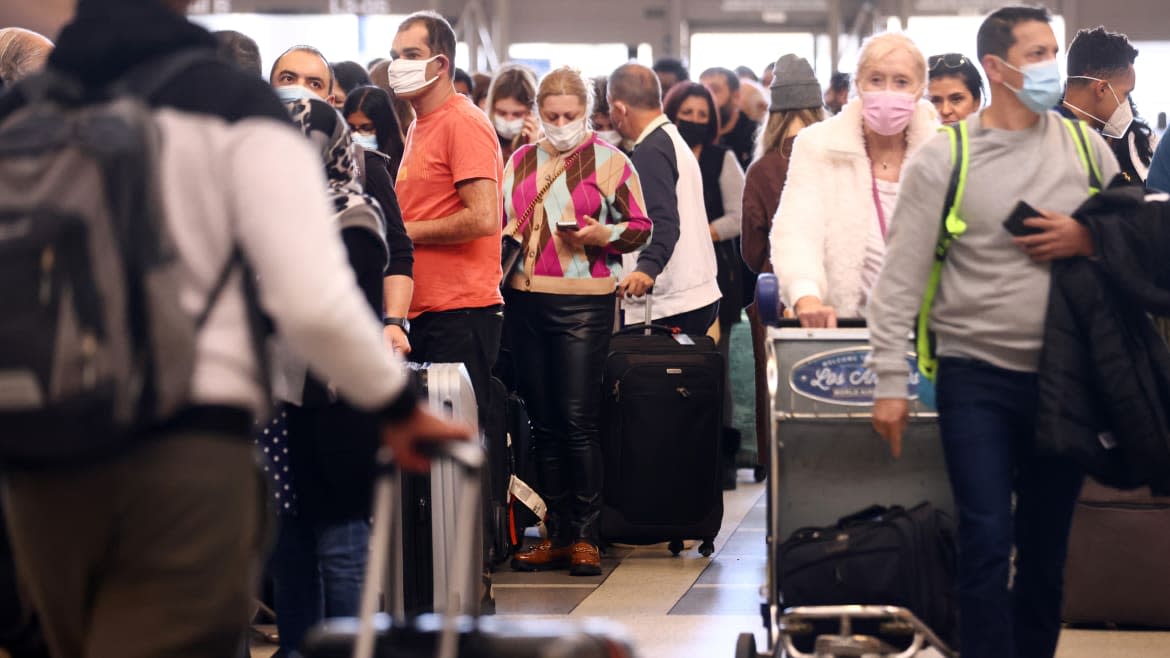Give the CDC Back Its Power to Issue Mandates

On January 29, 2021, Centers for Disease Control and Prevention (CDC) required everyone to wear a mask on mass transit, including airports and planes. That ended abruptly two months ago, when a federal judge in Florida struck down CDC’s mask mandate.
The ruling was politically divisive, sparking criticism from public health advocates, but many passengers rejoiced, unmasking and cheering in mid-flight. Whatever you think about masks, the judge’s opinion will be disastrous for the future of pandemic prevention and response in America.
Essentially, the ruling would handcuff CDC when the next crisis hits. The judge ruled CDC lacked power under the Public Health Service Act (PHSA) to require an unintrusive and highly effective intervention—face masks. This endangers CDC’s most basic powers to combat the spread of infectious disease—whether COVID-19 or more deadly ones. In response, the Biden administration appealed to the U.S. Court of Appeals for the Eleventh Circuit.
Trump’s Worst Judge Just Made Travel a MAGA Nightmare
Our legal team just filed an amicus brief in that appeal signed by 20 of the nation’s leading public health organizations and 231 experts in public health and the law. These public health leaders spoke with a common voice, arguing that CDC must have ample powers to act decisively and nimbly when the next health crisis arises—and it will. We argue that CDC’s core powers include evidence-based measures “to prevent the spread of infectious diseases into and throughout the United States.” The PHSA plainly empowers CDC to require masks in the midst of a massive and sustained public health emergency.
If the CDC can’t use a scientifically proven method to curtail transmission in a pandemic, we’re not sure what the agency could do. In short, CDC was acting at the very height of its authority.
The brief is signed by an unprecedented six former CDC Directors, who have led the nation’s response to all modern health emergencies—from SARS, MERS, and Zika to Ebola and Influenza H1N1. With decades of experience, they are uniquely positioned to evaluate the health challenges facing America and the tools needed to combat the spread of novel infectious diseases. The brief’s signatories include 24 deans of public health, medicine, nursing, and law schools, and over 100 scholars and health practitioners—including a former FDA commissioner and health commissioners from state, local, territorial, and tribal agencies.
The organizations signing the brief are unrivaled for their leading role in medicine and public health, ranging from the American Public Health Association (150 years old, with 22,000 public health professionals); the Association of American Medical Colleges (comprising all 155 accredited U.S. medical schools); the Infectious Diseases Society of America (12,000 epidemiologists and other infectious disease professionals); and the Robert Wood Johnson Foundation (the nation’s largest philanthropic foundation dedicated to health).
Let’s look at the fundamentals of public health law explained in the amicus brief.
First, CDC’s mask mandate is a straightforward exercise of the agency’s core and longstanding regulatory functions, in response to a global pandemic that has killed more than one million Americans and six million worldwide. The CDC and its predecessors have long exercised regulatory authority at national and state borders. Essentially, CDC is acting to protect Americans, when no state acting alone could do so.
Second, the brief explains the meaning of the word “sanitation,” which Judge Kathryn Kimball Mizelle—the federal judge in the Florida district court—interpreted in a bizarre fashion. She ruled that masks were not a form of “sanitation.” Our brief shows that when the PHSA was enacted in 1944, “sanitation” had a broad public health meaning. Authoritative dictionaries at the time defined sanitation as: “Devising and applying of measures for preserving and promoting public health; removal or neutralization of elements injurious to health; practical application of sanitary science.” As far back as 1948, when the World Health Organization was created, its major public health treaty was called the International Sanitary Regulations.
A Million Americans Are Gone. Mass COVID Death Is Here to Stay.
Of course, the PHSA contains more than just the single word “sanitation.” It also explains that CDC has the power to prevent the introduction, transmission, or spread of communicable diseases and “may provide for such inspection, fumigation, disinfection, sanitation…and other measures, as in his judgment may be necessary.” This final phrase, “and other measures,” provides additional support for the mask mandate. The phrase “other measures” should not be given an arbitrarily narrow meaning, which literally handcuffs the CDC. It is crystal clear that a transportation mask mandate fits comfortably within the plain text of the PHSA.
Our large and diverse team of amici—including health agency leaders, experts in public health and the law, and the nation’s leading medical and public health organizations—have decades of unique expertise in public health. All of us believe that CDC must have core regulatory powers to stop the spread of communicable diseases. Health emergencies will occur in the future with ever greater frequency and severity.
If the CDC has its hands tied behind its back, our nation will be decidedly less safe and secure.
Get the Daily Beast's biggest scoops and scandals delivered right to your inbox. Sign up now.
Stay informed and gain unlimited access to the Daily Beast's unmatched reporting. Subscribe now.

